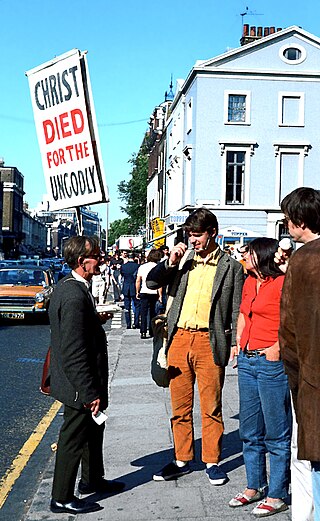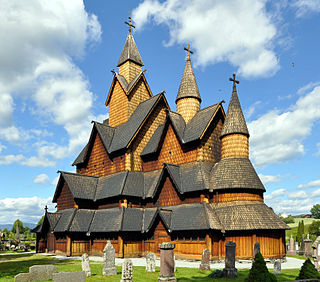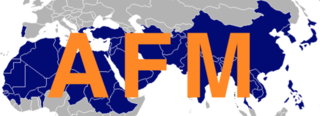Evangelicalism, also called evangelical Christianity or evangelical Protestantism, is a worldwide interdenominational movement within Protestant Christianity that emphasizes the centrality of sharing the "good news" of Christianity, being "born again" in which an individual experiences personal conversion, as authoritatively guided by the Bible, God's revelation to humanity. The word evangelical comes from the Greek word for 'good news'.
Religious conversion is the adoption of a set of beliefs identified with one particular religious denomination to the exclusion of others. Thus "religious conversion" would describe the abandoning of adherence to one denomination and affiliating with another. This might be from one to another denomination within the same religion, for example, from Protestant Christianity to Roman Catholicism or from Sunnī Islam to Shīʿa Islam. In some cases, religious conversion "marks a transformation of religious identity and is symbolized by special rituals".

A missionary is a member of a religious group who is sent into an area in order to promote its faith or provide services to people, such as education, literacy, social justice, health care, and economic development.

Proselytism is the policy of attempting to convert people's religious or political beliefs. Carrying out attempts to instill beliefs can be called proselytization.

Spiritual warfare is the Christian concept of fighting against the work of preternatural evil forces. It is based on the biblical belief in evil spirits, or demons, that are said to intervene in human affairs in various ways. Although spiritual warfare is a prominent feature of neo-charismatic churches, various other Christian denominations and groups have also adopted practices rooted in the concepts of spiritual warfare, with Christian demonology often playing a key role in these practices and beliefs, or had older traditions of such a concept unrelated to the neo-charismatic movement, such as the exorcistic prayers of the Catholic Church and the various Eastern Orthodox churches.
A house church or home church is a label used to describe a group of Christians who regularly gather for worship in private homes. The group may be part of a larger Christian body, such as a parish, but some have been independent groups that see the house church as the primary form of Christian community.
A Christian mission is an organized effort to carry on evangelism or other activities, such as educational or hospital work, in the name of the Christian faith. Missions involve sending individuals and groups across boundaries, most commonly geographical boundaries. Sometimes individuals are sent and are called missionaries, and historically may have been based in mission stations. When groups are sent, they are often called mission teams and they undertake mission trips. There are a few different kinds of mission trips: short-term, long-term, relational and those that simply help people in need. Some people choose to dedicate their whole lives to mission.

Religion in Norway is dominated by Lutheran Christianity, with 63.7% of the population belonging to the Evangelical Lutheran Church of Norway in 2022. The Catholic Church is the next largest Christian church at 3.1%. The unaffiliated make up 18.3% of the population. Islam is followed by 3.4% of the population.
Agricultural spiritualism or the Spirit of Agriculture refers to the idea that the concepts of food production and consumption and the essential spiritual nature of humanity are linked. It teaches that spirituality is inherent to human consciousness, is perhaps a product of it, and is accessible to all who cultivate it. The association with agriculture includes such agricultural metaphors as "cultivate" in language used by most mystics across history.

Christianity is the predominant religion in Mexico, with Catholicism being its largest denomination representing around 78% of the total population as of 2020. In recent decades the share of Catholics has been declining, due to the growth of other Christian denominations – especially various Protestant churches, Jehovah's Witness and Mormonism – which now constitute larger shares of the population. Conversion to non-Catholic denominations has been considerably lower than in Central America, and central Mexico remains one of the most Catholic areas in the world.
Spiritual philosophy is any philosophy or teaching that pertains to spirituality. It may incorporate religious or esoteric themes. It can include any belief or thought system that embraces the existence of a reality that cannot be physically perceived. Concepts of spiritual philosophy are not universal and differ depending on one’s religious and cultural backgrounds. Spiritual philosophy can also be solely based on one’s personal and experiential connections.
Youth ministry, also commonly referred to as youth group, is an age-specific religious ministry of faith groups or other religious organizations, usually from ages 12 to 30, whose mission is to involve and engage with young people who attend their places of worship, or who live in their community. Christian youth ministry usually encompasses one or more of the following:

Christian tourism is a subcategory of religious tourism which is geared towards Christians. As one of the largest branches of religious tourism, it is estimated that seven percent of the world's Christians—about 168 million people—are "on the move as pilgrims" each year.
Spiritualism is a metaphysical belief that the world is made up of at least two fundamental substances, matter and spirit. This very broad metaphysical distinction is further developed into many and various forms by the inclusion of details about what spiritual entities exist such as a soul, the afterlife, spirits of the dead, deities and mediums; as well as details about the nature of the relationship between spirit and matter. It may also refer to the philosophy, doctrine, or religion pertaining to a spiritual aspect of existence.

Religion in Angola is diverse, with Christianity being the most widely professed faith. The 2023 Afrobarometer survey found that 38% identified as Catholic while 39% identified as Protestant, Evangelical, Methodist, Anglican, Baptist, Lutheran, Presbyterian, Mennonite, Church of Christ and Seventh Day Adventist.

Religion in Ivory Coast is diverse, with no particular religion representing the majority of the population. According to the 2021 census, Islam is professed by 42.5% of the total population, while adherents of Christianity represented 39.8% of the population. In addition, 12.6% of Ivorians reported to be non-religious and 2.2% claimed to follow Animism.
Christianity is the predominant religion in Liberia, with Protestantism being its largest denomination. Liberia is a secular state and its constitution guarantees freedom of religion. While most Liberians have religious affiliations, traditional belief systems are widespread.

Christianity is the largest religion in Vanuatu. Vanuatu is an archipelago made up of 13 larger islands, and approximately 70 smaller surrounding islands, each home to multitudes of diverse cultural and religious communities.

Pentecostal congregations in Norway is the largest Protestant free church in Norway with a total membership of 40,725 people in 2020.

Anglican Frontier Missions is an American-based Christian mission organization that "To plant biblically-based, indigenous churches where the church is not, among the 2 billion people and 6,000+ unreached people groups still waiting to hear the Gospel for the very first time."










